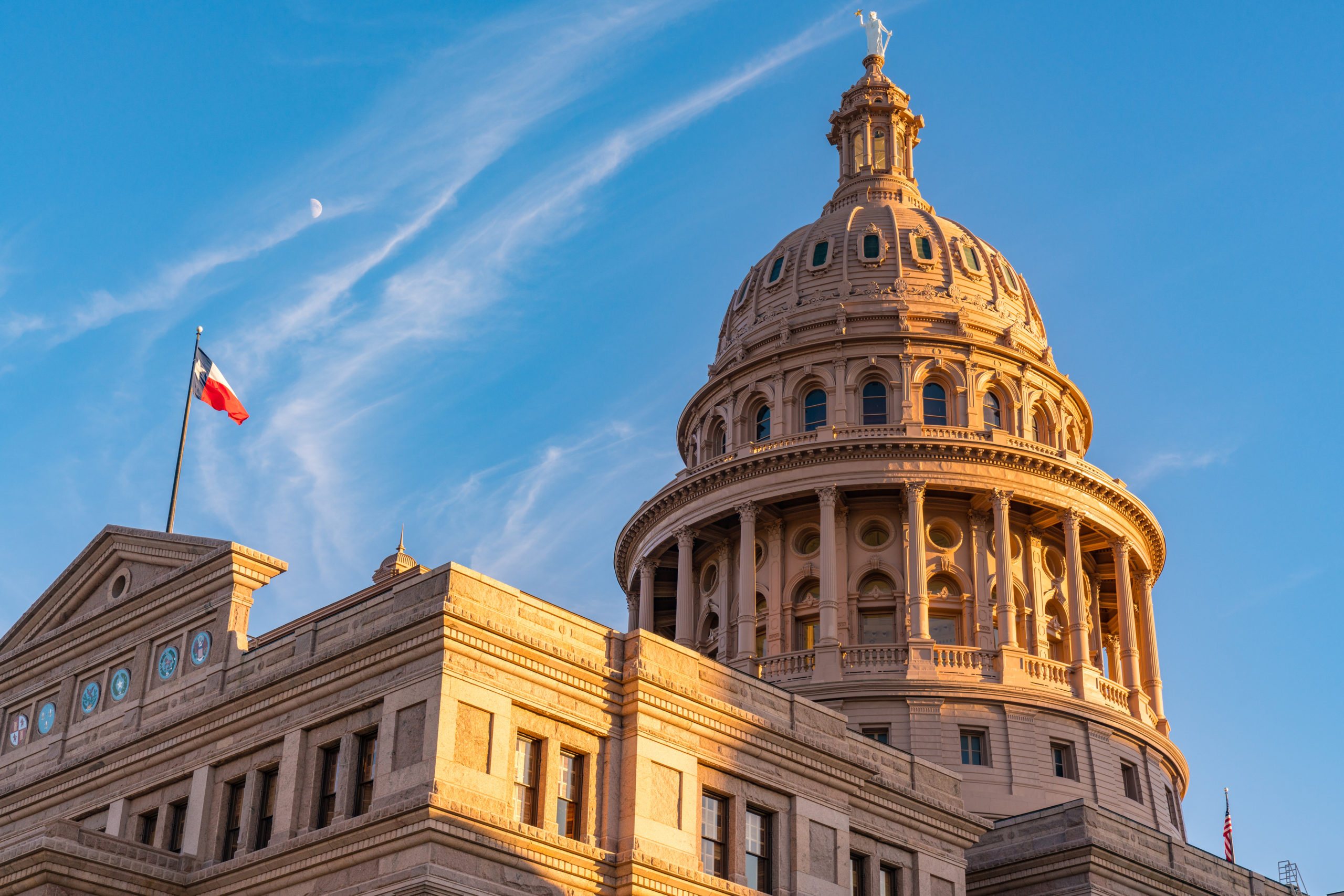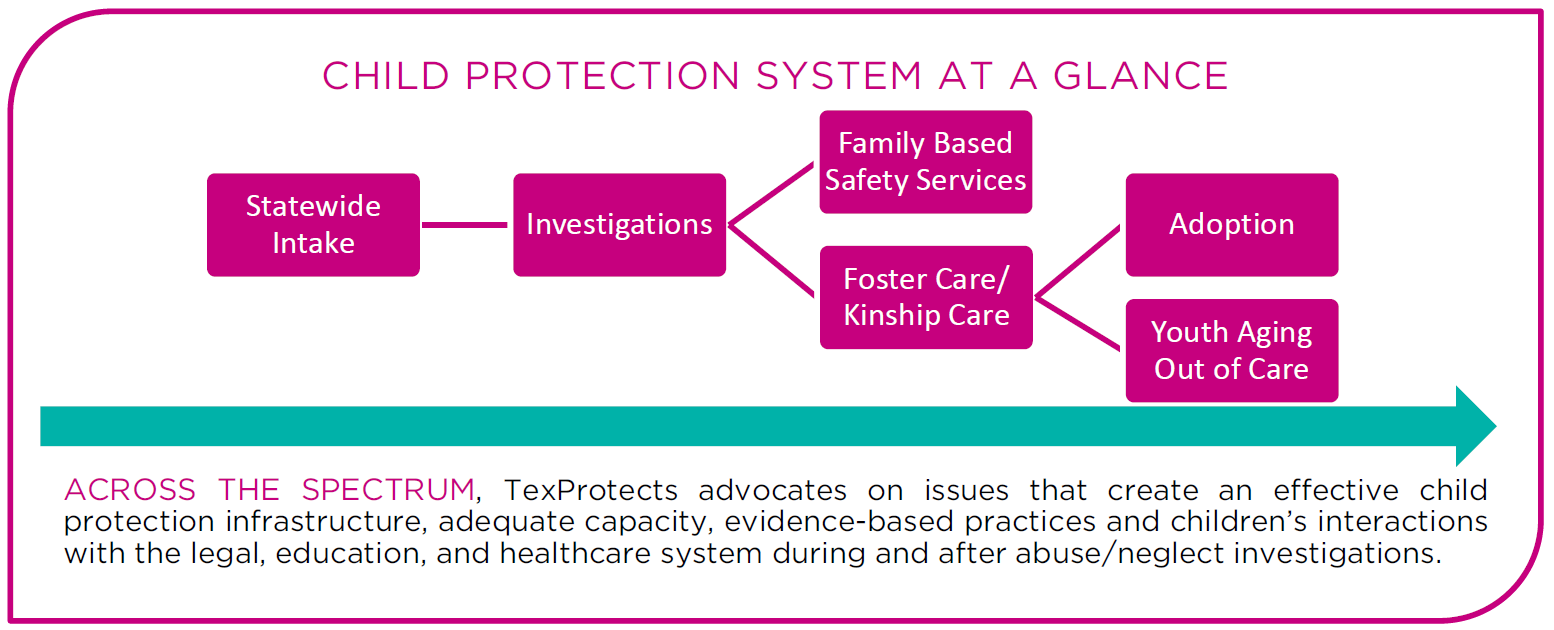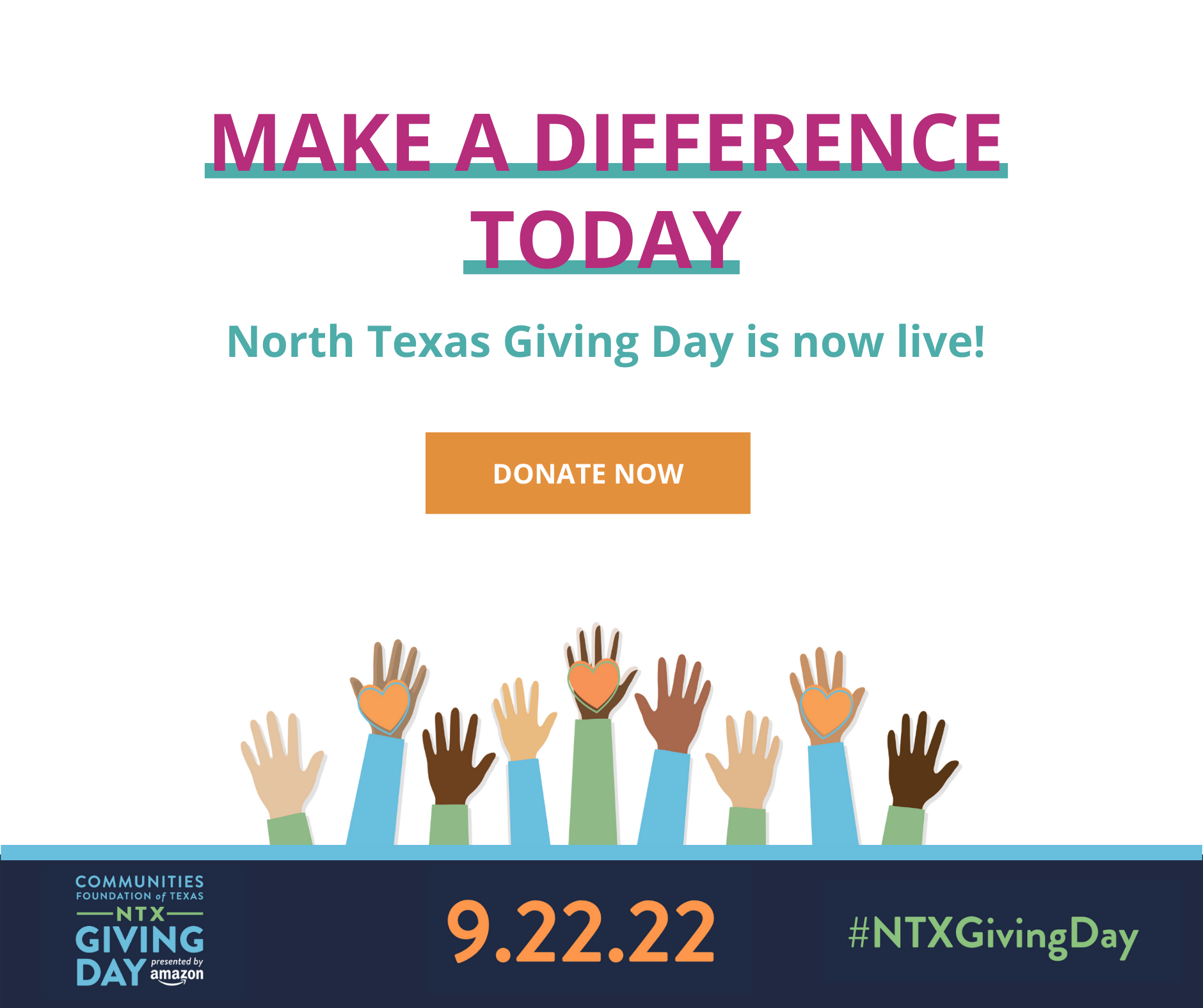TexProtects collaborated with the Child Protection Roundtable to provide budget input to the state
TexProtects has been working with our partners as part of the statewide Child Protection Roundtable to understand the effects of this pandemic on children and families, the possible fiscal implications, and the history of legislative budget cuts and their impacts in the past during times of economic challenges.
The Department of Family and Protective Services (DFPS) Legislative Appropriations Request (LAR) is the budget request made from the Department to the Legislature which details the funds that will be needed to continue their services for the next biennium. This LAR includes the projected budgets for Prevention and Early Intervention, Statewide Intake, Child Protective Investigations, Child Protective Services, and Adult Protective Services. One of TexProtects’ main focuses on providing input for the LAR was looking at prevention dollars.
Historically, when child abuse and neglect prevention funding has been cut, more money has ultimately been spent longer-term and there have been more confirmed child abuse victims. This is not wise-investment and not right for the children TexProtects aims to protect. We know there are strategies that work, and we worked thoughtfully and carefully with our partners to lay those out in our recommendations for the DFPS LAR.
Read the full Child Protection Roundtable DFPS LAR input below.
May 29, 2020
On behalf of The Child Protection Roundtable (CPRT), a consortium of statewide advocates, research organizations, health and education interests, direct service providers and other key stakeholders from over 50 organizations with child protection expertise, we greatly appreciate the opportunity to provide recommendations for the FY2022-2023 biennium Legislative Appropriations Request (LAR) of the Texas Department of Family Protective Services (DFPS).
The Child Protection Roundtable serves as a convener for member organizations engaged in child welfare which share a child-centered, common vision and leverage data, resources and strategy to achieve more progress collectively than could be achieved individually. The Child Protection Roundtable works in partnership with DFPS, the state legislature, and other stakeholders to improve the safety, health, and well-being of children.
More specifically, the goal of the Child Protection Roundtable is to be the leading voice and driving force in child protection public policy and governmental action in Texas that:
- Helps prevent child abuse and neglect before it occurs;
- Ensures protection and well-being of children and youth who come into state care; and
- Heals the ongoing trauma and other adverse consequences experienced by children and youth as the result of maltreatment.
In light of the public health crisis that has left so many in our state economically unstable, investment in the safety of our children at risk and in vulnerable situations must remain a priority. Please consider the following LAR recommendations for prevention and early intervention, supports for transition-age youth and young adults, children with developmental disabilities, Community-Based Care (CBC), CPS workforce, implementation of a trauma-informed system, and the Family First Prevention Services Act (FFPSA). In several instances, we have recommended increased investment; however, we would not want any of these increases to come at the expense of reduced investment in any of the other areas as they are all important to the overall system and the infants, toddlers, and children of all ages, and families, being served.
Prevention and Early Intervention
To break the cycle of child abuse and neglect and reduce the long-term strain on our child welfare system, we need to break the cycle of cutting child abuse prevention funds under DFPS’ Prevention and Early Intervention (PEI) division in times of fiscal challenge. Given the depth and breadth of the economic recession underway, coupled with stay-at-home orders and recommendations, we know from history that child abuse is likely occurring at higher rates even though reports may temporarily be down.
When the FY2004-2005 prevention budget was cut in 2003 by 35%, we saw a 20% increase in confirmed child abuse victims between 2004 and 2005. Once again, after the Great Recession in 2008-2009, we saw a 44% increase in confirmed victims in 2011. Maintaining our investment in prevention and early intervention is our best hope for avoiding yet another spike in abuse, associated costs, and strain on the CPS system.
Given the social isolation and increasing stress and risks for families due to COVID-19, the work of strengthening families and ensuring child safety must begin before a crisis occurs. Economic instability, domestic violence, substance use, and mental health challenges are highly correlated with increased risk for child abuse and neglect. While mitigating the health effects of the virus is primary, these longer-term risks will continue to affect families and child safety for years to come. As such, investment in the front end of the system is needed now more than ever.
The investments made in these prevention networks are critical lifelines of support during this crisis and should continue to be rolled out through existing contracts with community providers. These prevention services will keep children safe now and save the state money later, with an average return of investment between $1.26-$8.08. Further investment in family preservation, or secondary prevention, also saves money.
As noted by the DFPS 2018 Prevention Task Force Report, “Diverting 5% of families from Family Based Safety Services (1786) would save the state more than $9.4 million. Preventing 3% of removals (593) would save upwards of $20.3 million.”
The Child Protection Roundtable encourages the state to continue to increase investment in primary prevention programs through PEI to prevent child abuse and neglect, strengthen and support families, increase connections to community resources, and decrease truancy and delinquency for older youth. The current PEI strategic plan indicates that to adequately protect families, a 20% increase in prevention funds is needed every biennium. Currently, DFPS allocates 5% of their budget to the PEI division.
To preserve families and decrease the number of children entering the child welfare system, the state should preserve and increase investments in the following:
- Healthy Outcomes through Prevention and Early Support (HOPES)
- Helping Through Intervention and Prevention (HIP)
- Texas Nurse-Family Partnership (TNFP) and Texas Home Visiting (THV)
- Family and Youth Support (FAYS)
- Military Families and Veterans Pilot Prevention Program (MFVPP)
These programs have established infrastructure and community contracts/networks that can be leveraged to quickly and efficiently deliver proven programs to families who choose to enroll. To cut these programs would result not only in increased risks for children and long-term costs to the state, but local nonprofits and networks would be threatened, leaving even more Texans out of work and the state without a system by which to empower community family support and prevention programs.
Transition-Age Youth and Young Adults
The Child Protection Roundtable encourages DFPS to increase support for transition-aged youth and young adults. As DFPS has noted in the LAR for the current biennium, “[w]ithout such consistent services, youth are more likely to be involved in the criminal justice system, are at higher risk of teen pregnancy and parenting, have lower reading and math skills and high school graduation rates, are more likely to experience homelessness, and have higher rates of unemployment and likelihood of long-term dependence on public assistance.” Most services for older youth are federally funded through the Chafee program, which requires a 20 percent state match. The Chafee program allows DFPS to offer services that help youth and young adults pursue their education and employment, secure housing, and meet many other needs they have as they transition into adulthood. Unfortunately, DFPS has not had the funding to meet the projected needs of this population and those needs have increased substantially with the COVID-19 pandemic. The state should invest more in these youth and ensure youth who age out of care are able to succeed and receive support when they face crises.
Children with Developmental Disabilities
The Child Protection Roundtable supports ensuring access to long-term services and supports to children with developmental disabilities and their families in lieu of relinquishment of custody. These vital long-term services and supports include Medicaid-funded Community First Choice, behavioral supports, personal care services and Medicaid waivers. For its part, DFPS should provide access to training for families on how best to support the mental health needs of their children with developmental or intellectual disabilities, ensure Prevention and Early Intervention (PEI) programs assist families of children with developmental disabilities to access needed long-term services and supports, and comply with the Texas Promoting Independence Plan by seeking funding for Medicaid waivers for children currently living in DFPS-funded General Residential Operations so children with developmental disabilities can either return home, or move to a family-based alternative setting. Further details on these requests are set forth in EveryChild’s separate submittal of input to DFPS.
Community-Based Care
The Roundtable encourages DFPS to request full funding for continuing Community-Based Care (CBC) operations and contractual commitments in the present CBC catchment areas and to support the continued expansion of CBC during the upcoming FY2022-23 biennium. CBC has demonstrated early promise during Phase I service delivery and recently began to move into Phase II case management in the first of the four catchment areas under contract. As CBC moves forward into further phases and additional catchment areas, it will be important for DFPS to have the necessary resources to advance multi-contractor system characteristics such as data management and interoperability. It will also be important for DFPS to have the resources and supports to assure accountability and transparency to all system stakeholders, building further confidence that CBC is achieving its promise, as we all hope will prove to be the case. To the extent the present level of available resources is not sufficient to achieve these vital needs, the Child Protection Roundtable encourages DFPS to request those resources and will support those requests.
CPS Workforce
CPS workers perform selfless work for children and families in the child welfare system, even under normal circumstances. However, in the midst of COVID-19, CPS workers have had to make dramatic adjustments in how they work with families. When the rest of us have been told to stay home and stay safe, CPS workers have been asked to go out and keep other families and children safe. In addition to adjusting their practice, CPS workers are facing some of the most challenging cases of their career as COVID-19 has only amplified the stressors and challenges in many families who were already struggling. To effectively ensure child safety, the CPS workforce must be adequately supported, including the provision of appropriate supports to address their own mental health needs resulting from secondary trauma.
Texas has worked hard to improve salaries and reduce caseloads the past few years. It is vital that caseworkers have the ability to provide families and children in care with targeted case management. Cuts to CPS funding and salaries will result in more turnover and retention issues and will directly equate to declining outcomes for children and youth in care. The Child Protection Roundtable urges DFPS to continue investing in the CPS workforce by maintaining funding for their salaries and benefits and expanding secondary trauma services such as counseling complimented by debriefing with trained supervisors who can recognize the signs of secondary trauma and can refer for help when needed.
Trauma-Informed System
The Child Protection Roundtable supports DFPS’ continued leadership efforts to transform the Texas child welfare system into a trauma-informed and trauma-responsive system. DFPS was a leading partner in helping to develop the report Building a Trauma-Informed Child Welfare System: A Blueprint as part of the Statewide Collaborative on Trauma-Informed Care (SCTIC). There is broad support among Child Protection Roundtable membership and other stakeholders for ongoing efforts to improve training and use of trauma-informed practices throughout the child welfare system. There is also a clear understanding of the benefits of trauma-informed practices for children, families, and other system participants. The work of the SCTIC continues with the Implementation Taskforce, including the adoption of a DFPS rule to define trauma and trauma-informed care, and the creation of a website as a centralized location for information on trauma. The Child Protection Roundtable supports DFPS maintaining this priority in planning and budgeting for the next biennium.
Family First Prevention Services Act
The Child Protection Roundtable recommends that DFPS include adequate funding for successful implementation of the Family First Prevention Services Act (FFPSA) in its LAR Request. This funding should maximize opportunities to keep more children safely with their parents, prioritize placing more children in family-based foster care settings, and improve the quality of congregate care, especially in Residential Treatment Centers.
The DFPS LAR should include a placeholder for state funds needed to pull down a federal match to cover services that will prevent children from entering the Texas foster care system. DFPS should ask for state funds needed for more evidence-based substance use disorder, mental health, and in-home parenting skill building services. About 1.6 million Texans have lost health insurance during COVID-19 so far, meaning they might have lost access to mental health medications or other critical services that support children and their caregivers. During this difficult budget time, we encourage DFPS to maximize FFPSA dollars to help families at risk of having their child removed and placed in foster care. These investments will not only help families get through these difficult times, but they will also save money down the road in the budgets for CPS and other state services.
While crafting its LAR, DFPS should protect existing federal reimbursement for foster care placements by prioritizing strategies that would move children out of congregate care into family-based settings. When the FFPSA takes effect in Texas on October 1, 2021, Texas is at risk of losing federal reimbursement for its congregate care providers. The Child Protection Roundtable especially encourages three strategies:
- Establish a kinship navigator program using FFPSA dollars to enhance support for kinship caregivers, who accounted for more than half of Texas’ placements during FY19;
- Request funding to recruit more foster homes and anticipate increases in licensed foster homes resulting from the FFPSA requirement to align Texas’ minimum standards with the new model licensing standards, which may remove or reduce some barriers to licensure; and
- Shift funding to Treatment Foster Family Care to serve more children with high needs in family-based settings. The Roundtable also encourages DFPS to ask the legislature to expand eligibility for Treatment Foster Family Care to older youth. Treatment Family Foster Care is only available to children under 10, and about 90 percent of children and youth in Residential Treatment Centers were 10 and older in FY19.
DFPS should also protect existing federal funding by elevating the quality of Residential Treatment Centers by requesting funds for enhanced provider rates and start-up grants to incentivize providers to meet the FFPSA’s Qualified Residential Treatment Program standards.
Federal Pandemic Emergency Assistance
We acknowledge the considerable recent and ongoing federal activity directed toward providing emergency aid and support to states in responding to the global pandemic, and we hope DFPS will take full advantage of these supplemental resources for their intended purposes as they are enacted and thereafter disbursed. Most if not all of the areas of concern addressed in this letter have been impacted by the pandemic, and our hope is that these supplemental resources will help Texas make continued progress across the child welfare system, building on the momentum of the past three sessions.
Conclusion
Thank you again for the opportunity to provide input on the DFPS LAR for the FY2022-2023 biennium and for the dedication of DFPS to the safety, health, and well-being of the children and families of Texas. We look forward to our continued partnership and a productive 87th Texas Legislature. For any questions or concerns, please contact Knox Kimberly at knox.kimberly@upbring.org or (512) 567-6929.












